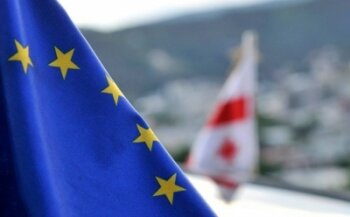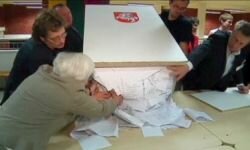NATO, Russia and Georgia
25 July, 2013
 Where is the point of convergence?
Where is the point of convergence?The Parliament overturned on July 12 presidential vetoes on two bills – one related to amendments to the law on broadcasting and the other envisaging cutting of President’s powers over the Georgian National Energy and Water Supply Regulatory Commission.
On the fifth anniversary of Russian-Georgian war in August 2008, the prospects of retaking occupied Tskhinvali region and Apkhazeti seem even vaguer.
By 8 August 2013, five years will pass since the August war which ripened and occurred during the reign of the National Movement, the political team that has almost vanished off by now.
Voters terminated the National rule in the parliamentary elections in October 2012. 10 months that have passed since then was supposed to help the new Government clarify the questions as to whether Georgia had a chance to avert the August war and conversely what factors precipitated it.
To answer them, the new Authorities had to initiate investigations at both parliamentary and executive levels which however they did not. We only hear wishful thinking which, try as they may, does not move the need in launching the investigation, any step closer to the reality.
The final solution seems to be continuously obscured in the cohabitation haze, as Western strategic partners of Georgia, for whatever reason, apply indirect pressure to the Government of Bidzina Ivanishvili to have the latter ditch any plan of embarking oneself on to unbiased investigation of the August war.
Who would benefit from hiding the truth? Of course, those, who ruled the country and made decisions at the time. To be more specific, it is United National Movement and its leader President Mikheil Saakashvili.
This is why perhaps the remnants of the Saakashvili’s team are so bitterly opposing every shaky move of the new Authorities to initiate scrutiny over the possible causes of the August war. Georgia will hardly attain any decent measure of success unless the causes undergo thorough analysis and the perpetrators get what they deserve.
First and foremost, Russia implemented absolutely predictable measures by turning the occupied Tskhinvali region and Apkhazeti into military bases. In doing so, Moscow availed oneself, at least temporarily, with a backdoor to requirements of the Treaty on Conventional Armed Forces in Europe and happily dotted the occupied territories with massive amount of military equipment. Surely, no European verifiers will have a chance to enter these quarters for inspection.
The Russian military units stationed in Akhalgori district are capable of severing the Tbilisi-Gori motorcade and railway links in a matter of few hours and imposing a blockade on the Georgian capital, cutting the country in two effectively. This is on top of the tacit threat to Tbilisi from the Akhalgori-based Russian artillery and missile systems.
Regarding the Russia’s seventh military base in the occupied Apkhazeti, in case of new war its main purpose would be to counter Georgia by obstructing Poti port and stonewalling Georgia economically. Intrusion of Russian armed groups into Achara to seize control of Batumi port is likewise and cannot be ruled out. It’s just Russia would have to give a due consideration to the Turkish factor in this case.
Creation of the powerful military base in the occupied Apkhazeti on the fifth anniversary of the August war should serve as a cause of more concern for NATO and its members on the Black Sea Cost rather than for Georgia.
By capturing Apkhazeti, Moscow gained a firm land, air and sea foothold in the eastern part of the Black Sea. Turkey, a NATO member state with an ambition of attaining the status of a country with the most powerful navy in the Black Sea and strengthening zones of its influence, should be the first to worry about such developments.
While the Russian artillery and missile systems put up in the occupied Tskhinvali region mainly endanger the Georgia’s statehood, the missile systems (primarily Iskander, a mobile theater ballistic missile system) installed in Apkhazeti, particularly Gali district, can easily reach Turkish hinterland unopposed.
After the revamp of Sokhumi and Ochamchire ports (which has actually begun), Russian military ships docked there would be enabled to enforce Russia’s influence in the Black Sea. Hence, it is obvious that Russia derived a remarkable benefit from the victory in the short war against Georgia five years ago.
In the wake of the regime change, many hoped that Bidzina Ivanishvili’s Government would act fast in engaging Russia’s leadership and moving the issue of the occupied territories forward. The events of the past ten months did not live up to expectations.
Despite recurrent positive messages of the Ivanishvili’s Government being sent to Moscow (take the very offers of Georgian help for the security of the forthcoming Sochi Olympics), the Russian Authorities stay least predictable and provocative.
Similarly, on the fifth anniversary of the August war, territorial integrity remains ever so elusive. It is interesting to know if the Russian Government decides to strike more or less normal relations with Georgia following the election of a new president in Georgia in October 2013 and Mikheil Saakashvili’s at least temporary ejection out of politics.





















































